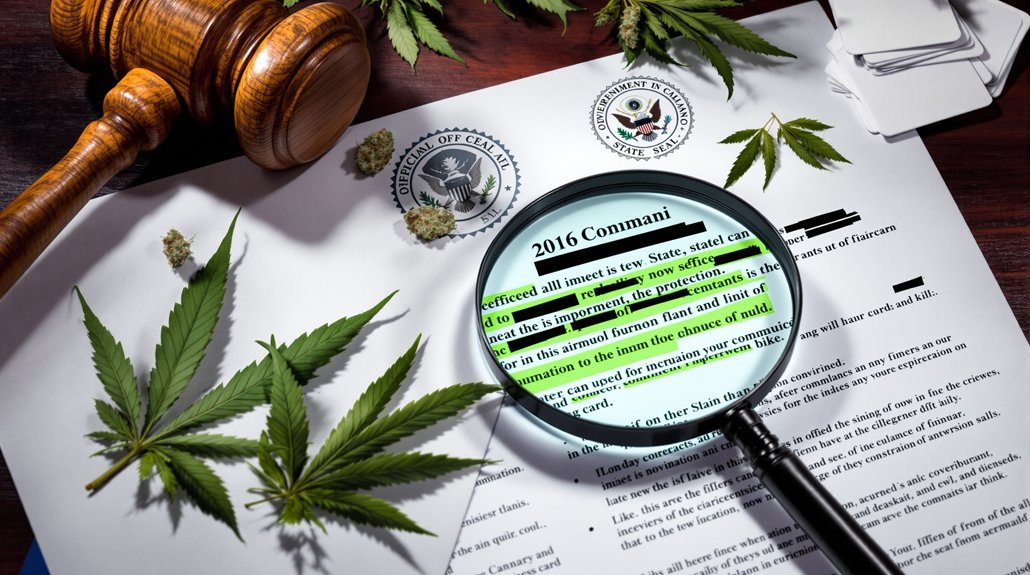Cannabis businesses across the United States face a labyrinth of background check requirements that shift dramatically from state to state. While some jurisdictions demand thorough screening with decade-long lookback periods, others maintain minimal oversight with basic criminal history reviews. These disparities create significant operational challenges for multi-state operators, who must navigate conflicting regulations while ensuring compliance across their entire workforce. The stakes remain high, as violations can trigger license suspensions, hefty fines, or complete market exclusion.
Core Components of Cannabis Industry Background Checks

Cannabis industry background checks encompass multiple verification layers that extend far beyond traditional employment screening processes. These thorough evaluations examine federal, state, and county criminal records, focusing specifically on disqualifying offenses such as drug trafficking, violent crimes, theft, and fraud that could bar employment or licensing eligibility.
Identity verification confirms Social Security Numbers, address histories, and legal names while validating employment credentials and educational backgrounds.
Financial responsibility assessments review credit reports, bankruptcies, and outstanding debts to identify potential theft risks. Drug testing protocols mandate pre-employment screening and may include ongoing workplace monitoring, though cannabis-specific considerations vary by state law.
Regulatory compliance checks involve Global Homeland Security sanction lists and OFAC screenings to prevent employing watchlisted individuals, ensuring operators meet strict state licensing requirements. Fair chance hiring policies are increasingly adopted by cannabis companies to avoid discriminatory practices during the screening process. Business owners typically face stricter regulations than their employees, requiring more comprehensive screening processes to maintain licensing compliance.
State Regulatory Variations in Screening Requirements
While cannabis remains federally illegal, individual states have developed their own thorough frameworks for screening cannabis industry employees, creating a complex patchwork of requirements that vary considerably across jurisdictions.
States establish distinct lookback periods ranging from five years to lifetime bans for certain offenses, with role-based requirements imposing stricter checks for security, retail, cultivation, or transportation positions.
Some jurisdictions maintain cannabis-specific worker registries separate from general employment screening systems.
Renewal intervals differ dramatically, spanning from annual to three-year cycles depending on state regulations.
Many states automatically trigger background check renewals alongside license renewals for cannabis operations. Additionally, some jurisdictions require employees to report new criminal charges that occur between scheduled renewal periods.
Documentation of ongoing compliance monitoring remains mandatory in numerous jurisdictions, while lapses can result in immediate suspension of work eligibility for cannabis employees. Certain positions regulated by federal agencies may still require drug screening despite state-level cannabis legalization efforts.
Disqualifying Offenses and Social Equity Considerations

Although states have embraced cannabis legalization as a path toward criminal justice reform, they simultaneously maintain strict disqualification criteria that can bar individuals from industry employment based on their criminal histories.
Felony convictions, particularly recent drug offenses, violent crimes, and fraud-related charges, commonly disqualify applicants. Connecticut bars individuals with money laundering or forgery convictions within ten years, while Mississippi prohibits employment for those with violent crime histories including murder and trafficking. These disqualifying convictions must not have been subject to an absolute pardon to remain as barriers to employment.
However, social equity provisions create exceptions to these restrictions. Individuals may improve their eligibility through obtaining a Certificate of Good Conduct or pursuing expungement of their records.
New Jersey prioritizes applicants with prior cannabis convictions, and many states exclude expunged cannabis-related offenses from disqualification criteria.
These programs aim to provide opportunities for communities disproportionately impacted by previous drug enforcement while maintaining public safety through continued restrictions on violent or financial crimes.
Renewal Cycles and Ongoing Compliance Obligations
Unlike the one-time screening process required for initial employment, cannabis industry workers face recurring background check obligations that extend throughout their careers. Most states require annual or biennial license renewals for cannabis facilities, with many mandating complete background rescreening during each cycle.
Failure to complete required rescreening can result in license denial or delays. Ongoing checks typically focus on criminal records for employees with customer or financial access, driving records for vehicle operators, and credit history for management positions. Regular rescreening helps employers maintain compliance while mitigating risks associated with negligent retention lawsuits from employees who may have committed offenses after their initial hiring.
State-specific requirements vary considerably, with Florida implementing mandatory rescreening for every renewal cycle starting July 2025. Cannabis businesses must track compliance documentation and guarantee screenings occur before renewal deadlines. Practitioners must retain fingerprints every 5 years to ensure ongoing compliance with state screening requirements.
Additional triggers include promotions, returning seasonal workers, reported incidents, and regulatory changes requiring immediate rescreening.
Recent Legal Developments Affecting Cannabis Employment Screening

As cannabis legalization expands across the United States, employment screening practices face unprecedented legal challenges that require employers to navigate an increasingly complex regulatory landscape.
Recent court cases, including Tyler v. Penske, reinforce that employers must assess specific job roles before implementing cannabis testing or taking adverse employment actions.
Pennsylvania and California have established strong protections for medical marijuana cardholders and off-duty cannabis users, though exemptions remain for safety-sensitive and federally regulated positions. Employers must now provide individualized assessment before disqualifying candidates based on cannabis-related criminal history.
The ongoing conflict between federal Schedule I classification and state legalization creates compliance challenges, particularly in aviation, trucking, and security clearance industries. New drug testing technologies like saliva and hair follicle tests are emerging to provide more flexibility in screening methods for these regulated sectors.
Many states now limit pre-employment THC screening, while litigation continues testing the boundaries of cannabis employment protections, especially regarding non-safety-sensitive positions.
State-Specific Examples and Multi-State Compliance Strategies
How can cannabis employers maintain compliance when operating across multiple states with dramatically different background check requirements?
Multi-state operators face significant regulatory complexity. California prohibits discrimination based on off-duty cannabis use, while Texas mandates criminal history screening with state-determined offense parameters.
Pennsylvania requires role-specific background checks with varying renewal cycles, and Colorado demands FBI fingerprint-based screenings that disqualify violent felonies and drug distribution offenses.
Successful compliance strategies require systematic approaches. Companies must track state-specific disqualifying offenses, lookback periods, and renewal requirements.
Illinois incorporates social equity provisions for expunged cannabis convictions, while other states maintain strict felony restrictions. Cannabis businesses must implement comprehensive screening for crimes involving dishonesty, fraud, theft, or embezzlement to protect their operations and maintain regulatory compliance.
Multi-state operators should implement automated compliance systems to monitor varying renewal periods, typically ranging from one to three years. Employers must continuously update their processes as clean slate laws automatically seal eligible criminal records, potentially making previously visible offenses inaccessible during background screenings.
Third-party vendor requirements, fingerprinting mandates, and real-time reporting obligations further complicate operations across jurisdictions.









